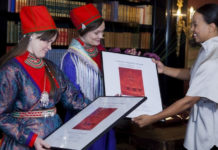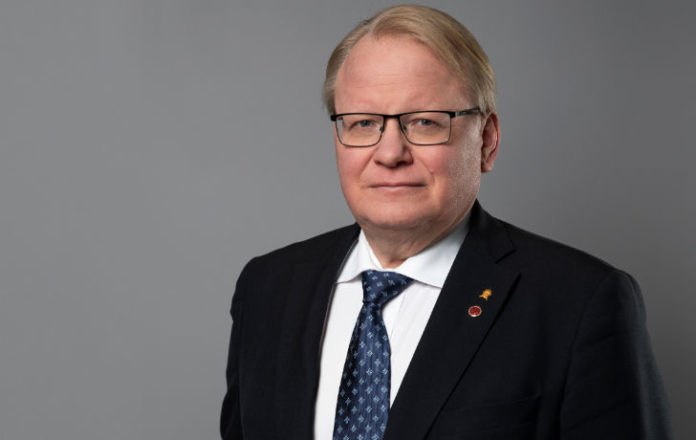Uppdaterad / Publicerad på Nyhetsskrift :
Försvarsminister Peter Hultqvist höll ett digitalt anförande under UK NATO Heads of Mission’s Forum där Storbritanniens ambassadör Judith Gough stod som värd. Temat på konferensen var desinformation och cyberfrågor.
I sitt anförande berörde försvarsministern frågor om desinformation under covid-19-pandemin, den svenska regeringens satsningar på cyber och psykologiskt försvar, försvarssatsningar som görs, vikten av det internationella försvarssamarbetet, samt övningsverksamheten i närområdet.
Från Nato deltog även dr Antonio Missiroli, Assistant Secretary General for Emerging Security Challenges, som talade om vikten av Natos samarbete med nära partner som Sverige och EU för att hantera utmaningarna från desinformation och cyberhot.
Tal: Försvarsminister Peter Hultqvists anförande på UK NATO Heads of Mission’s Forum, 15 juni 2020
Det talade ordet gäller.
Ambassadors, excellencies, distinguished guests, ladies and gentlemen – I am happy to be able to participate today, despite the circumstances. I would like to thank the British embassy for hosting this event.
I will speak about the changing security situation in the region and the challenges facing us – such as cyber and disinformation, and systems and structures to tackle them.
However, I will start by saying a few words on how the military-strategic situation in our region has deteriorated. The region has become less secure. Not least in the current situation when the focus is to combat the spread of COVID.19, which is affecting us all.
Challenges to European security must be met together and this calls for close dialogue and cooperation. Every year a vast number of exercises take place in our region. Common exercises in the Baltic Sea region signal that we take shared responsibility for the security. However, this year, the current situation to combat the spread of COVID-19 has affected many of the planned activities, not least the Aurora 2020 exercise that we had to postpone. Many exercises have been cancelled, leaving only a limited number of air and naval exercises to be conducted. However, for us, it is important to still carry out the exercises such as Swenex and the BALTOPS exercise, to signal that we continue to contribute to the security. Even if the participation is smaller than usual.
Russia, however, is carrying out its exercises in large scale, which creates an unbalance in activities in our region.
The Russian Armed Forces are highly affected by the COVID 19 crisis. Still, there is a substantial number of regular exercises carried out – the large snap exercise in late March, paratroopers landing on Franz Josef’s Land and an air defence exercise in Crimea, just to mention a few examples. In addition, there is an increased Russian naval and airforce presence and activity in the Baltic sea, coinciding with the NATO exercise BALTOPS 2020. This is routine Russian procedure but the level of activity has increased compared to previous years.
The Russian Armed Forces are also heavily involved in tackling the COVID 19 crisis, for example by constructing 16 medical centres across Russia. The CBR protection troops have been very active in different measures – also in Italy and Serbia.
Summarizing the Russian activities over the last few months, we found that they have executed tailor-made operations, tested long-range weapons systems in the region, and executed training and exercises.
Long distance patrols and surveillance with strategic bombers in the North Atlantic and Barents Sea, anti-submarine warfare and landings in the Baltic Sea as well in the Barents Sea are examples. Other examples include training with airborne troops and numerous tactical exercises with ground forces can be added to the list.
Several of these activities have been displayed in Russian media in order to stress that the Russian Armed Forces readiness and capability is not affected by COVID-19. The massive readiness inspection at the end of March, gathering 82,000 personnel is one example.
The Arctic remains an area of low tension in an international perspective. However, we must stay clear headed about Russia’s willingness to use military power against sovereign states to pursue political goals – as we have seen recently in modern times.
We have seen Russian deployment of advanced air defence system S-400, shipborne missile systems and Bastion coastal missile systems. The naval bases on the Kola Peninsula are home to Russia’s strategic nuclear submarines. It was a clear indication of the military importance Russia attaches to the region when we could observe around ten submarines being active simultaneously in the North Atlantic Sea, and in and around the Barents Sea, in the October 2019.
Influence campaigns and disinformation are far from a new phenomenon, but the current crisis with the COVID-19 pandemic has again showed the kind or threat disinformation poses to our open societies.
Different actors are deliberately using COVID-19 to disseminate mis- and disinformation aimed at undermining democracies, question trust-worthy sources of information and reliable guidance, or to influence or interfere in states’ and democratic institutions’ policy making.
Disinformation does not abide by any borders and as such it must be tackled with international cooperation; multilateralism is at the core of our joint efforts to counter disinformation, not least in the wake of COVID-19.
Our collective response to disinformation and other hybrid threats can only be addressed with actions that are based on our democratic values. Every activity initiated to counter disinformation must consider the EU’s fundamental values on free expression, independent media, democratic processes and the respect for our citizens’ right to privacy.
We work closely together in the EU and the joint activities that run within EU’s Action Plan on Disinformation, as well as the Rapid Alert System and the stratcom task forces in the EEAS. Especially the East StratCom Task Force is performing an important task through its webpage. We fully support all the efforts done to strengthen this system further.
Public diplomacy on the EU’s contribution to the global response is an imperative part of countering disinformation.
Nordic countries are all members of the International Partnership to Counter State-Sponsored Disinformation (IPCSD), an important platform for international cooperation to counter state sponsored disinformation and pool resources for joint and strategic communications efforts. The platform is also a good tool to maintain the links to the UK and US. In addition to EU efforts, we also have the Centre of Excellence for Stratcom in Riga and the Centre of Excellence for Countering Hybrid Threats in Helsinki, whose relevance has only become more obvious. Our Nordic countries could coordinate our strategic communication efforts with a strong narrative for our open and democratic societies.
Due to the deteriorated security situation the Swedish government has concluded that we need to develop a modern psychological defence capable to deal with the challenges of today.
We therefore appointed a Committee with the purpose to suggest the formation and organization of a new Government Agency with the overall responsibility to develop and coordinate Sweden’s psychological defence.
The Committee has just delivered its report where they propose that the new Agency will support, strengthen and enhance the Swedish society’s collective resistance within the psychological defence.
One of the major tasks the Committee suggests for the new Agency is to identify, analyse and counter information campaigns and other deliberately misleading information activities against Sweden and Swedish interests.
Another major task for the Agency would be to forward knowledge and research and thereby contribute to preparedness within psychological defence.
The government is currently finalising the formation of the new Agency based on the Committees findings and suggestions.
As mentioned, the security environment has worsened in practically all fields of defence and security policy. The cyber domain is a case in point.
It is clearer than ever that cyber security is a matter of both national security and prosperity. Our security and prosperity rests on digital foundations. The ability to reap the benefits from digitalisation must be matched by an equal ability to handle the threats and risks that is part of a digital society.
We all face increasingly advanced antagonistic actors. Let me say a few words on two recent Swedish initiatives to tackle cyber threats.
***
The Swedish government will establish a national cyber security centre in 2020. This centre will strengthen Sweden’s collective ability to prevent, detect and handle antagonistic cyber threats and reduce cyber related vulnerabilities. It will also provide support to private and public actors on how to improve their cyber security and protection against cyber attacks.
In the defence bill from 2015, the government stated its intent to establish a cyber defence capability. It was met with broad approval by Parliament and in 2016 the government tasked the Swedish Armed Forces. The Armed Forces have implemented this task with support from our signals intelligence agency – the Defence Radio Establishment, FRA.
Sweden also contributes personnel to the NATO Cyber Center of Excellence in Tallinn.
A core part of any cyber defence is human resources. The Armed Forces have established a structure for education, training and recruitment for cyber defence. One of the cornerstones is the cyber soldier training program. This program is held according to conscript law. The first class of conscripts will enlist in July. The program is roughly 11 months long and will be challenging and fast paced. This program will serve several purposes. First and foremost it will provide the Armed Forces with a steady flow of staff for various positions in the cyber defence structure. It will also, to a certain extent, support other agencies close to the Armed Forces and, in the long run, provide society as a whole with a number of qualified cyber experts. In addition to the cyber soldier program, the Armed Forces have established a centre for cyber defence related research together with the Royal Institute of Technology (KTH). This centre will be involved in the education and training of the cyber conscripts.
Sweden is increasing defence spending to reinforce our national military capability. From 2016-2020, Sweden has increased defence spending with approximately 3 billion Euros.
In August, the Government reached an agreement with the Centre Party and the Liberal Party to substantially increase defence spending during the period 2021-2025. The agreement entails that annual defence spending will have increased with approximately 2.5 billion Euros by 2025, in relation to 2020. This is an increase of the annual defence budget by more than 40 percent from 2020 to 2025. All in all, an additional 7.5 billion Euro will be added during the period 2021-2025.
This increase in defence spending provides for an improved military capability. Based on the proposals that were put forward by the Swedish Defence Commission we plan to propose to Parliament, among other things, the following measures:
A new and larger war-time organisation as of 1 January 2021, which will be designed for the task of defending Sweden against an armed attack. Total strength will increase from 60,000 to 90,000.
The number of conscripts, both men and women, called up for training every year will double from 4,000 to 8,000.
The Army will be reorganized and consist of three mechanized brigades, one smaller motorized brigade and, on the island of Gotland, one mechanized battalion with support elements. Additional ranger, intelligence, security, artillery, engineer, logistics and air defence units will be added.
When it comes to the Navy the existing corvettes will be upgraded with new air-defence missiles. Two new corvettes will be acquired in order to replace two older ones after 2025. One existing submarine will get a mid-life upgrade and therefore the number of submarines will increase from four to five. A new amphibious battalion will be established on the west coast of Sweden.
When it comes to the Air Force the current fighter JAS 39 C/D will be maintained, as the new fighter JAS 39 E is integrated into the squadrons and becomes operational. This allows the Air Force to keep six fighter squadrons. The development of the next generation fighter aircraft will also commence.
Defence intelligence capabilities will be strengthened as well as cyber defence.
The Home Guard will receive new vehicles and equipment.
Major investments will be made in logistics, in order to improve the ability to fight for sustained periods of time. Also, major investments will be made to acquire munitions and basic equipment.
During the past couple of months, I have conducted political deliberations with all the political parties in the Swedish Parliament regarding Sweden’s future defence and the upcoming Defence Bill, which will be presented to Parliament in September.
Unfortunately, these deliberations have not resulted in a broad political agreement. The main dividing line is that the opposition parties would like to see that the agreement includes additional funding for the period 2026-2030, while the Government would like to postpone the discussions on additional funding until 2023 when the economic effects of the Corona crisis have become clearer.
I stand ready to resume deliberations at any time as I find it very important to reach a broad political agreement. It sends a strong signal both nationally and internationally.
***
I will end my speech by underlining that the complexity and scale of the challenges at hand, means that no state can face them alone. Together we need to use the entire range of security policy instruments, enhanced national defence capability, international cooperation and dialogue and confidence-building measures.
Försvarsdepartementet












